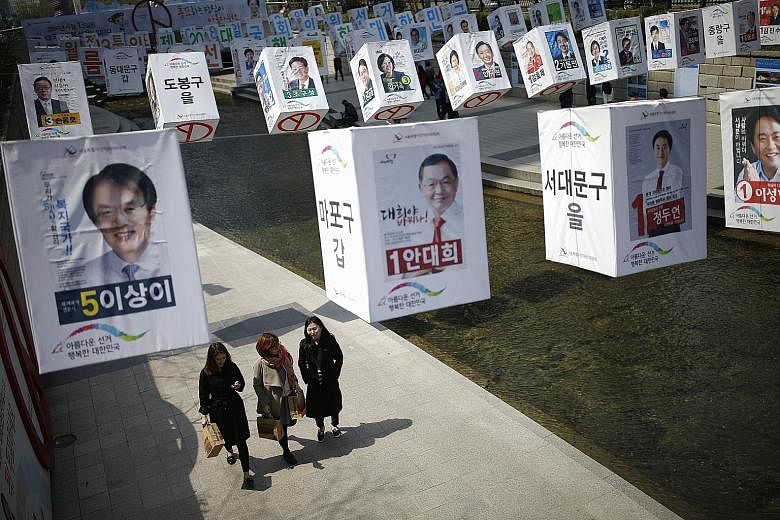SEOUL • South Korea's ruling conservative Saenuri Party is expected to regain its parliamentary majority in elections next week despite a sluggish economy and gridlock that made the last legislative term one of the least productive ever.
A divided opposition, riven by infighting that led to a split in the main left-leaning party four months ago, has left many voters, especially younger ones facing record-high youth unemployment, disenchanted.
Expected low turnout next Wednesday is likely to work to the advantage of President Park Geun Hye's Saenuri Party, which holds half of the 292 seats in the National Assembly. Before recent defections, it held a majority with 157 seats.
A strong showing by Saenuri would raise expectations that it will field the winning candidate in a December 2017 presidential election to find a successor to Ms Park at the end of her single five-year term.
Saenuri enjoys strong support among older voters and it has sought to cement that by emphasising its tough position on North Korea following a spike in tension on the peninsula triggered by the North's fourth nuclear test in January and a space rocket launch a month later.
The party has been doing well in opinion polls with 37 per cent support, according to a Gallup Korea survey of 1,000 people released last Friday, compared with 21 per cent for the main opposition Minjoo Party.
South Korea's economy grew 2.6 per cent last year and youth unemployment reached 12.5 per cent in February, the highest since the government started keeping records in 1999, compared with single-digit joblessness in other age groups.
The opposition is seen as unlikely to mount a serious challenge at the ballot box if disillusioned voters stay away.
"The Saenuri Party has its solid support," said analyst Bok Geum Hee of the non-partisan Powerhouse of Future Korea, which campaigns for young people to vote. "Moderate people might have come out to vote... but they think the main opposition is no different from the Saenuri Party."
President Park has blamed both sides in Parliament for hamstringing her push to boost growth, create jobs, and get on with structural reforms she says are needed to fix chronic problems in Asia's fourth largest economy. During its four years, the outgoing Parliament has been the most ineffective and slowest in passing legislation, according to the Korea Economic Research Institute think-tank, spending an average of 517 days to pass a law. Just 40 per cent of proposed Bills were adopted, it said.
Voter frustration could see turnout lower than the previous record low of 46 per cent, analysts say. "Politicians can't lay out realistic or specific plans and people are disappointed with that and have decided not to vote," said 21-year-old Seoul college student Bae Hyun Joong.
REUTERS

